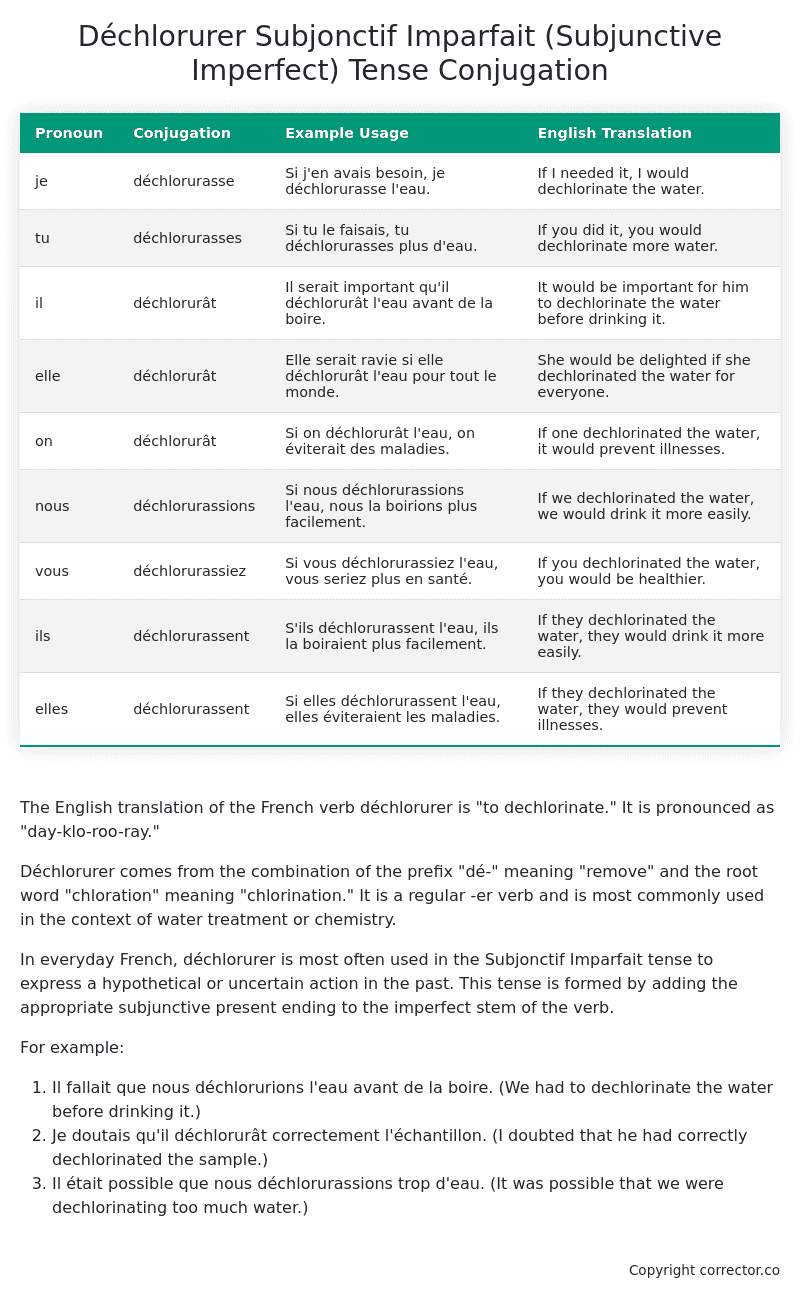Subjonctif Imparfait (Subjunctive Imperfect) Tense Conjugation of the French Verb déchlorurer
Introduction to the verb déchlorurer
The English translation of the French verb déchlorurer is “to dechlorinate.” It is pronounced as “day-klo-roo-ray.”
Déchlorurer comes from the combination of the prefix “dé-” meaning “remove” and the root word “chloration” meaning “chlorination.” It is a regular -er verb and is most commonly used in the context of water treatment or chemistry.
In everyday French, déchlorurer is most often used in the Subjonctif Imparfait tense to express a hypothetical or uncertain action in the past. This tense is formed by adding the appropriate subjunctive present ending to the imperfect stem of the verb.
For example:
- Il fallait que nous déchlorurions l’eau avant de la boire. (We had to dechlorinate the water before drinking it.)
- Je doutais qu’il déchlorurât correctement l’échantillon. (I doubted that he had correctly dechlorinated the sample.)
- Il était possible que nous déchlorurassions trop d’eau. (It was possible that we were dechlorinating too much water.)
Table of the Subjonctif Imparfait (Subjunctive Imperfect) Tense Conjugation of déchlorurer
| Pronoun | Conjugation | Example Usage | English Translation |
|---|---|---|---|
| je | déchlorurasse | Si j’en avais besoin, je déchlorurasse l’eau. | If I needed it, I would dechlorinate the water. |
| tu | déchlorurasses | Si tu le faisais, tu déchlorurasses plus d’eau. | If you did it, you would dechlorinate more water. |
| il | déchlorurât | Il serait important qu’il déchlorurât l’eau avant de la boire. | It would be important for him to dechlorinate the water before drinking it. |
| elle | déchlorurât | Elle serait ravie si elle déchlorurât l’eau pour tout le monde. | She would be delighted if she dechlorinated the water for everyone. |
| on | déchlorurât | Si on déchlorurât l’eau, on éviterait des maladies. | If one dechlorinated the water, it would prevent illnesses. |
| nous | déchlorurassions | Si nous déchlorurassions l’eau, nous la boirions plus facilement. | If we dechlorinated the water, we would drink it more easily. |
| vous | déchlorurassiez | Si vous déchlorurassiez l’eau, vous seriez plus en santé. | If you dechlorinated the water, you would be healthier. |
| ils | déchlorurassent | S’ils déchlorurassent l’eau, ils la boiraient plus facilement. | If they dechlorinated the water, they would drink it more easily. |
| elles | déchlorurassent | Si elles déchlorurassent l’eau, elles éviteraient les maladies. | If they dechlorinated the water, they would prevent illnesses. |
Other Conjugations for Déchlorurer.
Le Present (Present Tense) Conjugation of the French Verb déchlorurer
Imparfait (Imperfect) Tense Conjugation of the French Verb déchlorurer
Passé Simple (Simple Past) Tense Conjugation of the French Verb déchlorurer
Passé Composé (Present Perfect) Tense Conjugation of the French Verb déchlorurer
Futur Simple (Simple Future) Tense Conjugation of the French Verb déchlorurer
Futur Proche (Near Future) Tense Conjugation of the French Verb déchlorurer
Plus-que-parfait (Pluperfect) Tense Conjugation of the French Verb déchlorurer
Passé Antérieur (Past Anterior) Tense Conjugation of the French Verb déchlorurer
Futur Antérieur (Future Anterior) Tense Conjugation of the French Verb déchlorurer
Subjonctif Présent (Subjunctive Present) Tense Conjugation of the French Verb déchlorurer
Subjonctif Passé (Subjunctive Past) Tense Conjugation of the French Verb déchlorurer
Subjonctif Imparfait (Subjunctive Imperfect) Tense Conjugation of the French Verb déchlorurer (this article)
Conditionnel Présent (Conditional Present) Tense Conjugation of the French Verb déchlorurer
Conditionnel Passé (Conditional Past) Tense Conjugation of the French Verb déchlorurer
L’impératif Présent (Imperative Present) Tense Conjugation of the French Verb déchlorurer
L’infinitif Présent (Infinitive Present) Tense Conjugation of the French Verb déchlorurer
Struggling with French verbs or the language in general? Why not use our free French Grammar Checker – no registration required!
Get a FREE Download Study Sheet of this Conjugation 🔥
Simply right click the image below, click “save image” and get your free reference for the déchlorurer Subjonctif Imparfait tense conjugation!

Déchlorurer – About the French Subjonctif Imparfait (Subjunctive Imperfect) Tense
Formation
Common Everyday Usage Patterns
Interactions with Other Tenses
Subjonctif Présent
Indicatif Passé Composé
Conditional
Conditional Perfect
Summary
I hope you enjoyed this article on the verb déchlorurer. Still in a learning mood? Check out another TOTALLY random French verb conjugation!


